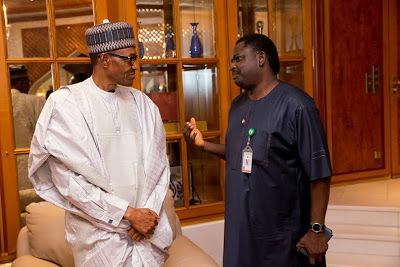From Juliana Taiwo-Obalonye, Abuja
On a sombre edition of Channels TV’s Sunday Politics, hosted by Seun Akinbaloye, three prominent Nigerians—Femi Adesina, Abubakar Malami, and Obong Victor Attah—shared heartfelt tributes and personal reflections on the late former President Muhammadu Buhari, painting a portrait of a leader defined by discipline, integrity, and patriotism.
Adesina: “He was not a bigot, but a man of integrity”
Adesina, who served as Buhari’s spokesperson for eight years, spoke movingly of his personal relationship with the late president. “Before I worked for him as Special Adviser on Media and Publicity, he was my senior friend,” Adesina recalled. “When my mother passed away in 2013 and we were having the obsequies in Lagos—a Christian programme—he came. He sat through it. This was one of the reasons I respected him so dearly. People used to demarket him, saying he was a religious bigot. But a bigot doesn’t do that.”
Adesina recounted the story of his appointment, saying, “Governor Kayode Fayemi told me that they took four names to him to pick one as Special Adviser on Media. He took his pen from his breast pocket, circled my name, and signed in front of it. Those are some of the things I will never forget.”
Reflecting on Buhari’s discipline and integrity, Adesina said, “If he had a meeting at nine, on the dot of nine he was seated. He would not say he’s president and come an hour later. He was a stickler for time. I guess that came from his military background. You cannot accuse President Buhari of anything that has the slightest affinity to corruption.”
On Buhari’s frugality, Adesina shared a personal anecdote: “One day, I went to see him in the house, in the presidential villa, and he invited me to the table. If you saw what the President ate—couscous, a small quantity, and some grapes—that was all. I was telling myself, see the president of this huge, blessed country; that was all he ate. He was such a frugal person, very prudent.”
Asked what the nation would miss most, Adesina replied, “His love for Nigeria. Buhari loved Nigeria. He told us that anybody who was going to dismember Nigeria would have a lot of them to contend with. He mentioned General Obasanjo, Abdulsalami Abubakar, the old brigade, and himself. He said, ‘We fought for the unity of this country, so anybody that will dismember this country will have to contend with us.’ He loved Nigeria dearly.”
Adesina emphasised the enduring lessons that the nation, the APC, and every Nigerian can draw from his legacy. Adesina remarked, “Be a man of integrity. Be a man who speaks and you stand by your words. Be a man entrusted with responsibilities and you stay true to the country. I think this is one of the most important legacies President Buhari has left.”
Abubakar Malami: “A father, mentor, and statesman par excellence”
Abubakar Malami, former Attorney-General and Minister of Justice, described Buhari’s passing as “a sad loss of a father, a mentor, and indeed a statesman par excellence.” Malami said, “He was a towering figure whose life was defined by service and sacrifice. Sacrifice and service that are flavoured by integrity.”
Malami stressed Buhari’s international reputation for fighting corruption: “Well, as far as the fight against corruption is concerned, he has been internationally recognised as a figure acknowledged by the African Union as champion of the fight against corruption. If you talk of infrastructure—the Second Niger Bridge, Lagos-Ibadan Expressway, Abuja-Kano Expressway—he takes the credit. In terms of economic development, he set the Nigerian state on a path that prevented economic disaster, such as the P&ID case that could have cost Nigeria over $11 billion.”
On Buhari’s political legacy, Malami said, “The 12 million constant votes that Buhari backed at every election are rooted in service, prosperity, accountability, and sacrifice to national development. If any of his disciples fit these characteristics, there is the possibility of inheriting those votes. You cannot rule out that the 12 million votes are part of the legacies Buhari left behind.”
Malami concluded, “His death is a colossal loss, not only to Nigeria but internationally. Buhari is a symbol of transparency, integrity, patriotism, and uncompromising honesty. His passing leaves a clear vacuum.”
Obong Victor Attah: “He set up a system all professionals admired”
Former Akwa Ibom State governor, Obong Victor Attah, who worked with Buhari at the Petroleum Trust Fund, praised the late president’s commitment to professionalism and systems. “He set up a system which all professionals admired. Executing government projects can sometimes be a problem, but he set up this professional outfit. You did your job, and you collected your money without having to know anybody or offer anybody any part of the money, which was excellent.”
Attah described Buhari as “principled” and noted that while he delegated authority, the system he put in place was effective: “We didn’t have to work with him. We worked for the organisation he headed, but directly with professionals.”
Reflecting on Buhari’s legacy, Attah recalled, “One incident I remember very strongly was his fight against drug abuse. He was accused of retroactive application of a law which led to the execution of those drug peddlers who had been caught before the law was made. But quite honestly, seeing what’s happening today with drug infiltration, I think if Buhari had a chance, probably this would not have been the case today.”
On the national response to Buhari’s death, Attah said, “I think it’s an honour that he deserves. Any president that would die in these circumstances deserves to be honoured. Buhari was keen on keeping this country one.”


